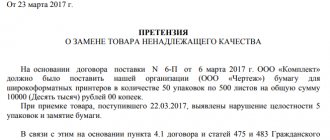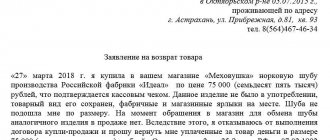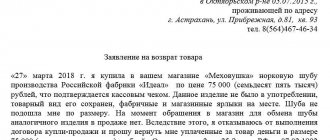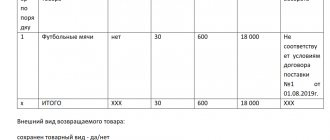Home / Complaints, courts, consumer rights
Back
Published: 10/19/2018
Reading time: 8 min
0
681
The Law of the Russian Federation of 02/07/1992 No. 2300-1 advocates the protection of consumer rights. The buyer, having discovered shortcomings in the purchased product, has the right to contact the seller to resolve the problem out of court.
- Personal delivery
- Other ways to submit an appeal
- Actions of the applicant upon receipt of a refusal from the seller to accept the claim Filing a complaint with Rospotrebnadzor
- Going to court
To do this, he draws up a written claim addressed to the seller (manufacturer, importer), in which he describes in detail the current situation, violations on the part of the seller, and also indicates the requirements put forward in accordance with the law.
When is an examination needed?
An examination is most often carried out if we are talking about technically complex goods or if the seller has doubts that the product sold actually has flaws. In such a situation, the seller initiates the examination and carries it out at his own expense. In this case, the buyer can be present at the actual assessment of the condition of the object in order to monitor compliance with all requirements and the conscientiousness of the experts’ performance of their duties.
Important!
If the examination shows that there are no defects, the buyer will have to pay for it. In other cases, the seller pays. The seller has no right to force the consumer to pay for the examination before its results.
Can the seller refuse to conduct an examination? Yes, but only if the burden of proof of the occurrence of defects lies with the buyer. The law speaks of two such cases:
- if the product does not have a warranty period;
- if the consumer applies after the warranty period has expired.
In these cases, the seller will be responsible for the defects if the consumer proves that they arose before the goods were transferred to the consumer or for reasons that arose before that moment. Accordingly, the burden of proof (conducting an examination) rests with the consumer.
If, by law, the seller is obliged to conduct an independent examination of the goods, but for some reason refuses, then the buyer can either go directly to the court (in which case the examination can be carried out as part of a trial), or conduct the examination independently and, after receiving its results, apply again to the seller or to court. By the way, if the examination confirms the presence of a defect, the seller will be obliged to compensate the buyer for the costs of it.
Personal delivery
One of the options for filing a claim is to personally contact the addressee. In this case, the document is prepared in two copies. When applying, one copy, including additional copies of documents, remains with the seller, and the second - with the applicant. On the applicant’s copy, the person accepting the claim must put an appropriate mark indicating acceptance of the document.
The note on receipt of the claim must include the following information:
- incoming numberif the organization keeps records of incoming correspondence;
- Full name and position of the person responsible for receiving the document;
- date of acceptance of the claim;
- signature and seal of the organization.
If the claim is submitted to an individual entrepreneur, then the absence of a stamp on the document is acceptable. Any employee of a trade organization who has such authority has the right to accept a written request.
If the seller’s representative refuses to accept the claim and put a mark on the applicant’s copy, then in this case, to record the refusal, you can attract witnesses and re-apply the document to the retail outlet.
Any person can act as witnesses, but it is better not to involve relatives and spouses, since they are interested parties, and during further legal proceedings this may negatively affect the consideration of the case.
Two witnesses will be enough for an appeal . In their presence, it is necessary to invite the seller to accept the claim. If there is a refusal, one copy of the document should be left at the point of sale. It is advisable to find out the name and position of the employee who refused to accept the application.
On the second copy, which remains with the applicant, a note indicating the seller’s refusal should be made. The document must indicate that the employee (full name, position) refused to accept the claim in the presence of witnesses (full name). Witnesses must put their signatures on this copy. If the case is subsequently considered in court, witnesses will be invited to testify.
How can a buyer conduct an examination himself?
Experts are any persons who have special knowledge on the subject of the examination: these can be both private expert organizations and state expert institutions. You can find a list of organizations working in the required profile in your city on the Internet.
It should be noted that services for conducting commodity examination are not licensed, expert organizations are not required to be members of self-regulatory organizations, therefore, when choosing such an organization, it is better to check several parameters:
- The status of an expert institution (legitimacy of activity) - whether this company operates, whether it has the right to engage in such activities (you can check on the website of the tax service https://egrul.nalog.ru/ by entering the TIN or OGRN of the organization).
- Availability of experts of the required profile and their competence (education, work experience) - usually all data is indicated on the company’s official website, but you can request it in person.
- The territorial scope of the activity is to assess the possibility of conducting an examination and the expert’s visit to the site, arrival and participation in further court hearings.
- Cost of examination – we recommend focusing on the average cost of similar examinations in your region.
Important!
You must notify the seller that you plan to submit the goods for independent examination. He, in turn, may want to take part in this process (that is, to ensure that the procedure proceeds without violations and that the conclusions drawn correspond to the actual results obtained).
How is the examination carried out?
The examination should answer a number of questions (depending on the buyer’s claims):
- Do the stated characteristics correspond to the real ones?
- Does the product really have the defect that the buyer is referring to?
- Are the identified defects acceptable or significant?
- If there is a defect, what caused it? Was it a production issue or was it due to improper use?
- Does the defect significantly reduce the quality of the product?
What should be in the conclusion after the examination, read here.
An important question from those listed above is how the defect arose. If the reason is a manufacturing defect, incorrect transportation or careless storage in the store, the buyer is not responsible for such a defect in the product. If the reason is due to the actions of the buyer (improper operation, physical impact, etc.), then you cannot count on compensation or return of the goods.
Another difficult point is proving that the information about the product does not correspond to its real characteristics. In this case, it will be necessary to collect documents indicating the parameters of the product so that experts understand what to compare the actual results with.
Liability for refusal to accept a claim. Alternative delivery methods
The legislator has not provided for any administrative or other liability for refusal to accept a claim, and therefore it is impossible to force anyone to take this action. At the same time, this does not affect the ability of the injured party to protect its rights, since it only needs to prove the fact of filing a claim if such a pre-trial procedure is mandatory (for example, by virtue of Part 5 of Article 4 of the Arbitration Procedure Code).
In addition to the not always convenient personal delivery of the claim, the party also has alternative methods of delivering the claim:
- registered letter with notification and description of the attachment, sent by Russian Post;
- courier services for delivering correspondence;
- email;
- fax message;
- forms of online communication with a seller, supplier or other organization on the corresponding Internet resource.
The first method is generally accepted; it is recommended to resort to other options additionally - to speed up the process of considering a claim, the original of which is sent by mail. When sending a registered letter, the sender, if necessary, makes it much easier for himself to prove the fact of sending a claim.
How much does the examination cost?
The cost of the examination depends on the pricing policy of the organization, the type of product and the number of parameters that experts evaluate. In general, the price will be affected by the number of goods, their location (can the item be brought to the laboratory, or does a specialist need to come to your home), the number of documents that the buyer has in his hands (with data about the product), the period of work, and so on.
We remind you once again that in the case of an independent examination, the buyer initially pays for it independently. But if the presence of a defect, shortcoming, or incorrect information during the sale is confirmed, the seller will compensate all expenses.
Results
To summarize: in order to avoid difficulties in proving compliance with the claim procedure, it is recommended to send the claim by registered mail with acknowledgment of delivery to the addressee.
If for some reason this is impossible, and the addressee refuses to personally receive the claim, it is worth using the help of witnesses. You can find more complete information on the topic in ConsultantPlus. Free trial access to the system for 2 days.
And then?
After receiving the results of the examination, the buyer can contact the seller again and demand that the product be exchanged for a similar one, but without defects, return the money to him or compensate for the costs of eliminating this defect.
The results of the examination can be challenged in court. If the procedure was carried out by the seller, the buyer files the claim; if the examination was organized at the initiative of the buyer, the seller retains the right to go to court.
Follow the news, subscribe to the newsletter.
When quoting this material, an active link to the source is required.
Actions of the applicant upon receipt of a refusal from the seller to accept the claim
If the seller does not want to fulfill the obligations established by law and refuses to accept a written request, then the buyer should proceed to the next stage of dispute resolution. To protect their rights, the consumer has the right to appeal to Rospotrebnadzor or a judicial authority.
Filing a complaint to Rospotrebnadzor
Rospotrebnadzor is an executive body whose powers include protecting the rights and interests of consumers. To protect their interests, the consumer can file a justified complaint.
It is worth noting that Rospotrebnadzor cannot return the money spent on the purchase of low-quality goods, since resolving property disputes is not within its powers.
The basis for filing a complaint with Rospotrebnadzor may be the purchase of a low-quality product or receipt of a low-quality service from a contractor. In this case, the authority will be able to conduct an inspection of the seller and identify facts of violation of the law.
The text of the complaint contains the following information:
- name of the addressee where the applicant is sending the complaint;
- applicant details (full name, address, contact phone number and email address);
- information about the violator (seller’s name, address, contact details);
- the essence of the appeal indicating violations of the law (references to the Law) on the part of the seller (manufacturer, importer);
- a list of documents attached to the complaint (if sent electronically, scanned copies of documents are sent);
- date and signature of the applicant.
A sample complaint to Rospotrebnadzor can be viewed here. A complaint from a consumer will be considered by Rospotrebnadzor within 30 days from the date of its acceptance (Article 12 of Law No. 59-FZ). The applicant will be notified of the results of the inspection within this period.
The applicant can submit an appeal to Rospotrebnadzor in one of the following ways:
- Personal visit to the regional authority . During the reception hours established in a particular department, the consumer will need to submit an application to an authorized employee. The appeal will be registered on the day of submission, and the applicant will be informed of the deadline for its consideration.
- Sending an appeal on the official website of the department . On the official Internet resource of Rospotrebnadzor, the consumer will need to go to the “For Citizens” category, where in the window that opens, select the “Appeals from Citizens” option. After familiarizing yourself with the rules for filing complaints, you will need to proceed to the form for creating a complaint. The consumer will need to enter the required information in all the proposed tabs and submit the completed form for review.
- Mailing . The complaint can be sent by registered mail with acknowledgment of receipt. Receipt by the sender of the notification will indicate the delivery of the application to the department.








